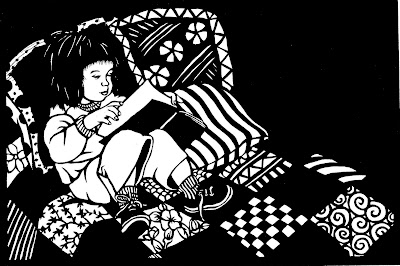 Sara Reading; cut paper; Copyright, 2007
Sara Reading; cut paper; Copyright, 2007According to a recent NEA report, (read about it in the
Boston Globe) almost 20% of teens never read for pleasure, and, even worse, almost half of Americans aged 18 to 24 never read a book for pleasure. While many smart people have since debated both the report's accuracy and the significance of the results, I am nonetheless convinced that pleasure reading at any age has many benefits, not the least of which is
pleasure, and I know there are too many people who haven't discovered how wonderful books (and other reading materials) can be. This is important to me because people who read for pleasure tend to be better educated, more successful, happier, thinner, etc. than people who don't. Also, most importantly, they are more likely to buy the books I write and illustrate.
I'm lucky enough to have three teen/young adult kids (daughter age 15, sons 17 and 19) who love to read. I'm also wise and humble enough to realize that genes, the influences of other people, and of course, luck have probably played as big a role in making them readers as I have. Nonetheless, from watching the development of pleasure readers and nonreaders among my kids and their friends, and from encouraging readers during my past life as a child therapist and teacher, I have gleaned some tips that might increase the odds of making your older child a reader. I'm mostly skipping the standard, well-supported ideas and going with my family's quirky strategies. Here are my first five tips -- I'll try to follow up with more soon.
1. Lower your standards By all means, stock your kids' bookshelves with some award-winners and great literature -- but also provide plenty of series books, collections of favorite comic strips, books that are too young for your kids, books featuring fart/gross humor, action-adventure stories, romance novels -- whatever floats your kids' boats. There's actually research supporting the unique ability of "formula fiction" (code expression for junky series books, whether Nancy Drew or Janet Evanovich) to build kids' reading fluency and comprehension skills. And my own experience is that junk books are the literary equivalent of marijuana; they're a gateway substance to trying and getting hooked on more serious stuff.
2. Cherish books with cracked spines and dog ears It means they've been read rather than preserved on the shelf, and it means your kids aren't growing up so afraid of damaging a book that they're afraid to touch one. There's nothing wrong, of course, with encouraging your kids to use book marks and to refrain from leaving their books in the puddle of milk next to the cereal bowl, but don't go so overboard that you make books the equivalent of fragile heirlooms (and if you have books in that category, lock them up until your kids are older. Well, grown.) Contrary to what the school librarian may have led you to believe, treating a book with less than perfect respect will not turn you into a pervert or worse. Heck, I used to color in my favorite books, and I'm not yet a mass murderer.
3. Keep books in the bathroom The tub in our first floor bathroom is so small that no one uses it for bathing anymore -- and over the last few years, it has slowly but surely filled up with books that people enjoy reading while on the john. (It's probably a good idea to grab the Purell after handling one of them...) This tip is not a good idea if you have too few bathrooms -- since one of the main side effects of keeping books in the bathroom is that people spend way more time in there.
One of my own favorite rituals as a teenager was soaking for hours in the clawfoot tub on our third floor while reading one of the "bathtub" books stored in the bookcase across from it (that was a wonderfully big bathroom). Our bathtub books were mostly tear jerkers like Love Story by Erich Segal, "outgrown" favorite middle grade novels like The Wolves of Willoughby Chase by Joan Aiken , and humorous memoirs like My Family and Other Animals by Gerald Durrell and Life Among the Savages by Shirley Jackson -- but depending on your kids' reading tastes and gender, you might need a very different selection. Such was the power of those books and that experience that I can quote long passages from most of them, and my sisters and I still squabble over custody of the original water-stained copies.
4. Teach this equation: Waiting = Reading Before heading off to the dentist's office at my house, the scramble isn't so much to floss for the first time in months (though it should be), but to find where the heck you left your book. I'm actually disappointed if there's not much of a wait.
Last night, when I took my oldest to the airport for his flight back to school, we had to turn around and come home, not because he forgot his ticket or his cell phone, but for something equally essential -- his book. And one of my kids even brings a paperback to Kennywood, the local amusement park, so he can read while he stands in line. As a bonus, my kids are much less impatient about long waits than most kids are.
5. Get audio books rather than DVDs when you head off on a long trip It's much more fair to the driver, who can't (or at least shouldn't) watch the DVD along with everyone else, and it builds listening muscles amazingly well. Choose books wisely - suspense, action, humor, etc. are especially important if you're stuck in a traffic jam or wedged between your annoying little brother and the laundry basket of smelly beach towels. We get most of our selections from the library and always grab more books than it seems like we need, in case one (or more) turns out to be a dud.
Okay, more tips in a few days. Now get busy hanging shelves in the john.
 Christi Gerstle over at Novel Conclusions had a great post about what we can do to encourage reluctant readers.
Christi Gerstle over at Novel Conclusions had a great post about what we can do to encourage reluctant readers. 




Oooooh, it’s SO easy to talk about reading I do it ALL the time!
I do it ALL the time! 
If a non-reading adult you know has seen a movie they loved and it happens to be based on a book, encourage them to read the book, letting them know it’s usually much better than the movie. In fact, you’d be happy to lend them your copy. (If you feel you’ll see it again.)
Invite them to come with you to a Book Fair/large book sale of some kind, and point them in the direction of the books that sync with what they’re usually drawn to – action, romance, horror, history, graphic novels – it doesn’t matter – something that will get them to pick up a book – and when the investment is only a dollar or two, they won’t feel they have much to lose!
Jeanne,
Did you leave this suggestion on Christi’s blog? I could copy it, but then it wouldn’t be from you. Could you take a minute if you didn’t, so we build her list? Thanks!
How was the summer for you?
Kathy